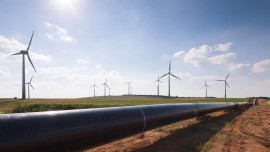Wintershall Dea Sells Its WIGA Stake to SEFE
Wintershall Dea AG has announced the sale of its 50.02% stake in WIGA Transport Beteiligungs-GmbH and Co. KG to SEFE Securing Energy for Europe GmbH.

Wintershall Dea AG has announced the sale of its 50.02% stake in WIGA Transport Beteiligungs-GmbH and Co. KG to SEFE Securing Energy for Europe GmbH.

QatarEnergy has signed time-charter party (TCP) agreements with Qatar Gas Transport Company Limited (Nakilat) for the operation of 25 conventional-size LNG vessels as part of the second ship-owner tender under QatarEnergy’s historic liquified natural gas (LNG) Fleet Expansion Program.

Energean has reported its full-year revenues of $1,420 million, representing a 93% increase from 2022, and adjusted EBITDAX of $931 million, marking a 121% increase from the previous year.

Venture Global LNG has announced its plans to acquire a fleet of nine liquefied natural gas (LNG) transport vessels, expanding its ability to sell and ship its own cargoes, according to Reuters.

Chinese CNOOC is set to begin talks with Angola for oil exploration opportunities, according to a statement from the Angolan oil and gas ministry.

Shell has announced changes to its 2030 carbon reduction target and scrapped a 2035 objective, citing lower power sales and increased demand for gas in the energy transition, committing to achieving net zero emissions by 2050.

Singapore's middle distillates stockpiles have surged by 8% week on week, reaching a new high since September 2021, as net exports of both diesel/gasoil and jet fuel/kerosene have slipped by 98% and 26%, respectively, according to Reuters.

Globally, women account for only 16% of the global energy sector workforce, while men make up the remaining 84%. In the renewable energy sector, women's representation is slightly higher, at around 32% of the workforce, according to the International Renewable Energy Agency (IRENA). In Egypt, women's representation in the energy sector is a focus of attention, particularly in the context of the country's transition to a green economy. However, women represent only 22% of work force in the oil and gas sector, and 32% of workforce in the renewable energy sector, according to AlMarsad AlMasry.

To begin with, the goal of gender budgeting is to address gender inequity and the empowerment of women via the use of fiscal policy and management. The examination of how various genders are impacted by policies and related budgets is also known as gender budgeting. The strategy does not call for budgets that are different for men and women. Rather, it entails proactively determining how expenditure affects gender equality, which will help to better target funding decisions and provide better results.